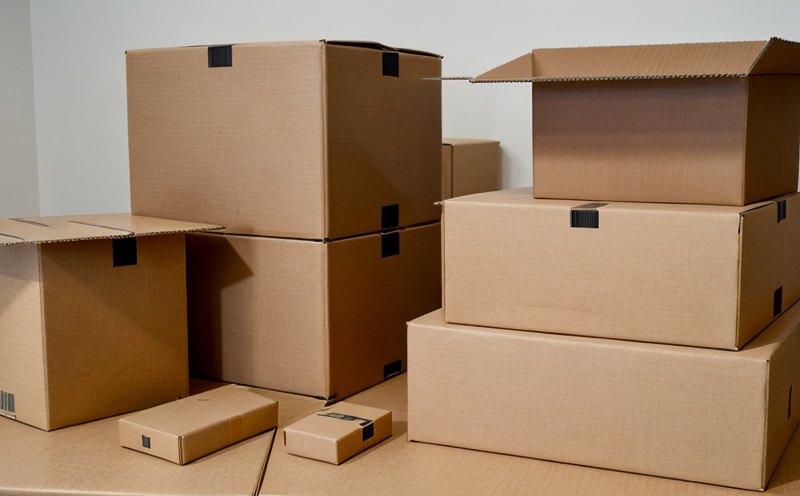ASTM D1735 Water Vapor Permeability for Rigid Packaging
The ASTM D1735 test method is a critical standard used to measure the water vapor permeability of rigid packaging materials. This service ensures that packaging meets industry standards and helps manufacturers comply with regulatory requirements by accurately assessing how much moisture can pass through the material over time.
Water vapor permeability testing is essential for ensuring that packaging effectively protects products from moisture damage, especially in environments where humidity levels are high. The test involves placing a sample of rigid packaging between two chambers: one maintained at constant relative humidity and temperature while the other is kept at controlled conditions. As water vapor diffuses through the material, it is captured by the second chamber.
The ASTM D1735 standard specifies that this process should be conducted for 24 hours, allowing for accurate measurement of permeability. The result is reported as the amount of water vapor transmitted (WVTR) per unit area over a given period. This value helps determine if the packaging meets specific performance criteria set by manufacturers or regulatory bodies.
For rigid packaging applications such as food containers, pharmaceutical bottles, and electronic enclosures, understanding how much moisture can penetrate is crucial for maintaining product integrity and safety. By using ASTM D1735, companies can ensure their products remain protected from environmental factors that could affect quality or shelf life.
This service plays an important role in the development phase of new packaging designs by providing insights into material selection and design optimization based on permeability data. It also supports ongoing quality control efforts by validating that existing processes continue to meet specifications.
Proper sample preparation is critical for accurate results, which involves cutting specimens according to precise dimensions outlined in ASTM D1735. Additionally, ensuring consistent environmental conditions during testing ensures reproducibility across multiple samples and labs.
The equipment used includes specialized chambers designed to maintain controlled humidity levels and temperature settings necessary for the test duration specified by ASTM standards. Calibration of these instruments is essential to guarantee reliable measurements.
Real-World Usage Notes
Rigid packaging made from materials like polyethylene terephthalate (PET), polycarbonate, or high-density polyethylene often requires testing for water vapor permeability due to its direct contact with moisture-sensitive contents.
The test helps in selecting appropriate barrier coatings that can enhance the performance of rigid packaging by reducing moisture ingress.
ASTM D1735 provides a standardized approach which facilitates comparison between different types of materials and their performance under various environmental conditions.
In conclusion, ASTM D1735 water vapor permeability testing is vital for ensuring the integrity and safety of rigid packaging products. It ensures that manufacturers adhere to strict quality control measures while meeting industry standards and regulatory requirements.
Benefits
Implementing ASTM D1735 water vapor permeability testing offers numerous advantages for companies involved in packaging design, manufacturing, and quality assurance. Here are some key benefits:
Enhanced Product Protection: Ensures that rigid packaging effectively protects products from moisture damage, maintaining their quality and safety.
Regulatory Compliance: Helps companies meet regulatory requirements by ensuring they comply with established standards for water vapor permeability.
Improved Product Performance: By understanding the exact amount of moisture that can pass through packaging, manufacturers can optimize their designs to better suit specific applications and environments.
Informed Decision-Making: Provides valuable data for R&D teams to make informed decisions about material choices and process improvements.
Cost Efficiency: Reduces the risk of product spoilage or damage, thereby minimizing costs associated with rework or customer dissatisfaction.
In summary, ASTM D1735 testing is a cost-effective way to ensure that rigid packaging performs as expected in real-world conditions. It supports continuous improvement initiatives and contributes significantly to overall business success by safeguarding product quality throughout the supply chain.
Industry Applications
The ASTM D1735 water vapor permeability test has wide-ranging applications across various industries. Here are some key sectors that benefit from this service:
Pharmaceuticals: Ensures that drug containers maintain their integrity and protect medications from moisture damage.
Food & Beverage: Helps in selecting appropriate packaging materials to preserve the freshness of food products.
Consumer Electronics: Protects sensitive components within devices by preventing water vapor from corroding internal parts.
Chemicals: Ensures that containers for hazardous substances are fully sealed against moisture ingress.
Aerospace: Guarantees that space hardware is protected from environmental factors during long-duration missions.
By providing accurate measurements of water vapor permeability, ASTM D1735 supports industries in meeting stringent quality and safety standards. This ensures reliable performance across diverse packaging applications.
Customer Impact and Satisfaction
By offering ASTM D1735 water vapor permeability testing, our laboratory contributes significantly to customer satisfaction by providing high-quality services that meet industry expectations. Our focus on precision and accuracy ensures that customers receive reliable data which they can use confidently for decision-making processes.
Customers benefit from several aspects of this service:
Accurate Testing Results: Ensures that packaging meets required standards, enhancing trust between manufacturers and end-users.
Compliance Support: Helps customers stay compliant with regulatory requirements, avoiding potential penalties or recalls.
Quality Assurance: Provides peace of mind knowing that products will perform consistently across different environmental conditions.
We strive to exceed customer expectations by offering prompt, reliable service and exceptional technical expertise. Our commitment to excellence ensures that customers receive the best possible results from their testing needs.





